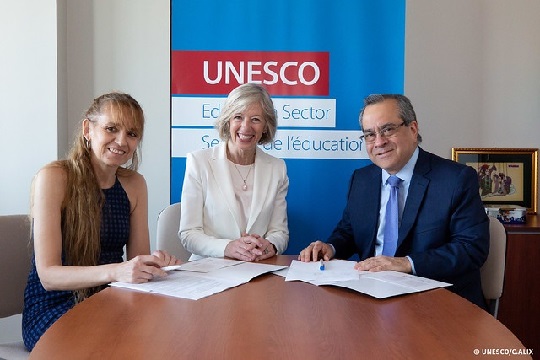UIS and World Bank Join Forces to Help Countries Measure Student Learning
Share
04/07/2019
The World Bank and the UNESCO Institute for Statistics (UIS) announced today a new partnership to help countries strengthen their learning assessment systems, better monitor what students are learning in internationally-comparable ways and improve the breadth and quality of global data on education.
This partnership is part of a collaborative effort to tackle the global learning crisis marked by the slowdown in the improvement of access to education in recent years – leaving over 262 million children, adolescents and youth out of school— and hundreds of millions who are in school but not learning enough.

“Our focus is on supporting developing countries to strengthen their national assessments and on working with other international partners and countries to generate the necessary consensus to produce the best education statistics necessary for an evidence-based policymaking process,” said Stefania Giannini, Assistant Director-General for Education of UNESCO. “This partnership will allow us to collaborate on supporting countries with the tools and technical support they need to track progress towards the Sustainable Development Goal 4 (SDG 4), to see what is working, what challenges remain, and where improvements can be made.”
Both the Sustainable Development Goal on inclusive, equitable and quality education and the education-related component of the World Bank’s Human Capital Index (HCI) released last year provide an impetus for measuring learning outcomes in internationally-comparable ways, and over time.
The partnership will harness key global initiatives of the two institutions to strengthen countries’ national capacity for the design, administration and analysis of large-scale national learning assessments. The UIS is leading global efforts to expand internationally comparable data on learning outcomes, leveraging countries’ national measurement efforts. The World Bank is developing a Global Education Policy Dashboard to enable countries to monitor how well their education systems are oriented toward improving learning and educational attainment for all children.
“Several countries like Indonesia are already making progress in generating better data on learning, while others like Brazil and Kenya are using better data to inform policies that drive improvements in learning outcomes. The WB-UIS partnership aims to support similar efforts in many more countries around the world,” said Omar Arias, World Bank Manager for Global Knowledge and Innovation in Education.
“Global education data generation and exchange is another key element of the partnership. The two organizations will create a unified data source of globally comparable indicators on education for use as a global public good,” said Silvia Montoya, UIS Director.
The partnership is framed within the overarching Strategic Partnership Framework signed last year between the United Nations and the World Bank Group to consolidate their joint commitment to help countries implement the 2030 Agenda for Sustainable Development.